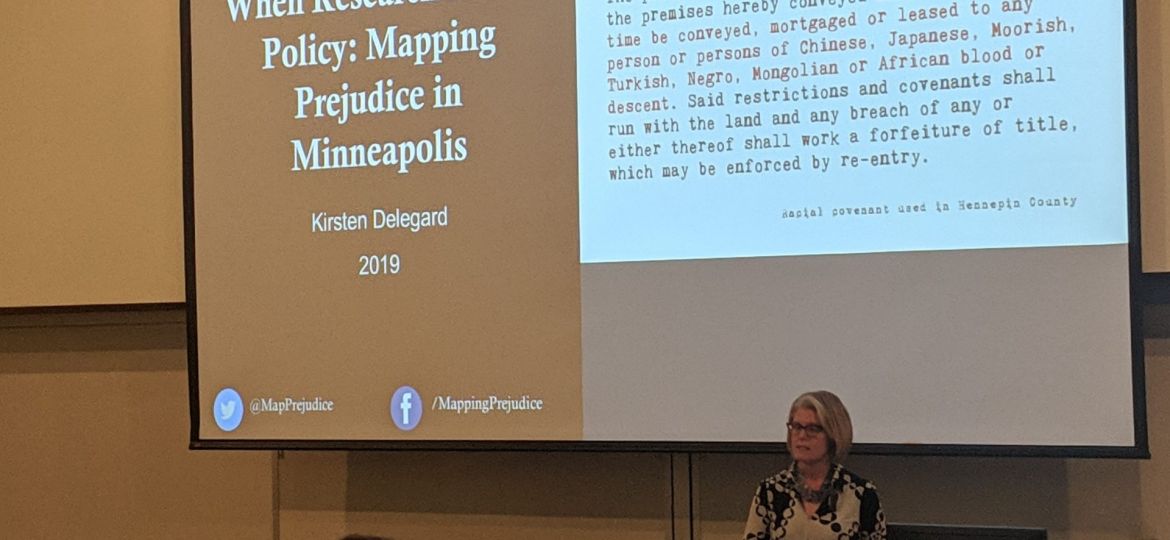
Public historian Kirsten Delegard and Minneapolis city planner Heather Worthington gave a presentation at St. Olaf College Thursday, March 7 regarding their work to highlight and combat racial disparities in Minneapolis.
The event, entitled, “When Research Meets Policy: Public History, Planning, and Structural Racism in the City,” was a collaborative effort discussing Delegard’s “Mapping Prejudice” project. The project aims to map how racial restrictions are embedded in the geography of the city. It also aims to inform Minneapolis 2040, the comprehensive plan proposed by Worthington and the Minneapolis city council for decision-making and land use in Minneapolis and surrounding areas.
One of the major goals of Minneapolis 2040 is to address the inequitable access to property created by racialized covenants, Worthington said. The plan also aims to maintain equity as the city continues to grow.
The Departments of History, Sociology-Anthropology and American Studies as well as the American Conversation and Academic Civic Engagement (ACE) all served as organizers for the event.
The “Mapping Prejudice” project, which served as a framework for the policy changes the Minneapolis 2040 plan promotes, attempts to highlight the racial disparities present in Minneapolis by analyzing racialized covenants which exist in property deeds for homes across the city.
“If Minneapolis is such a great place, where do these racial disparities come from?” Delegard said. “Getting into the structures that undergird these relationships is where I was interested, and not only finding out about [racial covenants], but communicating that in a way that could really catalyze some conversations.”
“We are here to change the grand narrative away from personal pathologies and cultures of poverty,” Property Records Specialist Penny Petersen said. “For me, it is also sort of a hidden history of Minneapolis and Hennepin County, because you often know there’s something wrong, but to know how, how this came about, how this is different from other places, is really important.”
Delegard went on to explain how the “Mapping Prejudice” project is unique in the way it brings together many different collaborators for a common goal. Many of these collaborators have been St. Olaf students and faculty who participated in the project through the St. Olaf ACE program.
“’Mapping Prejudice’ perfectly meets the goals of ACE because it applies classroom learning in a real-world context that benefits the students in their learning and civic awareness,” Alyssa Melby, assistant director of ACE said. “The faculty do a great job about having students process and reflect upon the experience of working on the ‘Mapping Prejudice’ project as it connects to themselves, their academics and the community at large, tying together these threads into a deep, meaningful learning opportunity.”
“Mapping Prejudice” has maintained a strong connection with St. Olaf since 2017. Professor of History Eric Fure-Slocum was the first St. Olaf faculty member to come into contact with the project, and it was his eagerness in collaboration that attracted Delegard to St. Olaf.
“I think it’s this dedication to cutting-edge pedagogy here at St. Olaf that is the reason that we ended up having this relationship,” Delegard said. “You have professors here that are changing and adapting and trying to figure out how to make classes as relevant as possible.”
Fure-Slocum went on to explain his personal interest with the project.
“Both as a scholar and as a teacher, I am eager to find ways to make this history so much more palpable for students,” Fure-Slocum said. “And then, to be able to participate in it.”
St. Olaf students have contributed over 2,000 computerized codes while working with the project. The codes allow racial covenants to be found in property deeds, an integral part of learning how many racial covenants exist throughout Minneapolis.
Professor of Sociology-Anthropology Marc David expanded on the value that Mapping Prejudice has at St. Olaf.
“For me, its pedagogical value is great,” David said. “Its ability to teach key concepts in sociology – anthropology is compelling and certainly very effective. This project is great in conveying real-world institutional conventions to students.”
In connecting the work of the “Mapping Prejudice” project to Minneapolis city policy, Worthington expressed her appreciation for the project.
“For policy to work, it requires constituencies to see the need for remedies,” Worthington said. “This project does just that.”
Delegard made it clear that it is St. Olaf students who have the ability to right the wrongs inflicted by these covenants and create a better future.
“I feel like we’re at a crossroads,” Delegard said. “It’s your generation that is really going to decide. If we continue without a serious course correction, I worry about the future of democracy. I think it’s your generation that is really coming up. You are the ones who are going to envision these new ways of change.”

